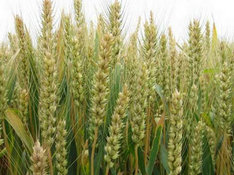英语听力文摘 English Digest 439、冬小麦(在线收听)
Winter Wheat
According to the famous song, America is beautiful for its spacious skies, purple mountains, and amber waves of grain. If you were to make a music video based on these lyrics you’d probably want mid to late summer images of fruit-laden trees and fields of rippling wheat under sunny blue skies.
But where the amber waves of grain are concerned, the image might be slightly misleading. While at least some wheat in the United States and Canada is planted in the spring and harvested in the summer, much is planted in the late fall and harvested in the spring.
Winter wheat manages to survive freezing temperatures and being buried under piles of snow. How do these plants pull it off?
After being planted in the mid to late fall, winter wheat seedlings undergo a process called cold acclimation. They begin to grow and poke through the soil as the temperature drops to around forty-eight degrees Fahrenheit.
As the plant’s leaves absorb light the seedlings produce large amounts of carbon and store it in the crown, the part of the plant where root and shoot meet underground.
At the same time, the absorption of light combined with low temperatures triggers the expression of certain genes that help the plant tolerate freezing temperatures.
Although scientists do not fully understand precisely how this process works, it is clear that carbon production and freezing tolerance are necessary for the plant’s survival.
When the snow melts and temperatures rise in the spring, the plant has plenty of stored energy for steady growth. By mid spring, many North American wheat fields are beautiful with waves of grain ready for harvest.
由那首著名的歌得知,美国因它广阔的天空,紫色的山峦,还有琥珀色的谷浪而美丽。如果你打算取材于这些歌词作曲,那你也许想要夏末载满果实的树和晴朗蓝天下翻滚的麦浪的图像吧。
但是有谷浪的地方,那样的形象也许稍令人误解吧。虽然美国和加拿大或多或少有些小麦是在春天播种,夏天收割,但大部分是晚秋播种,第二年春天收割的。
冬小麦设法在结冰的温度下生存,还要埋于厚厚的大雪下。这些作物是怎样成功生存的呢?
在仲秋或晚秋播种后,冬小麦种子经历了被称为冷驯化的过程。它们在气温降到48华氏温度后开始冲破土壤生长。当小麦叶吸收阳光后,种子产出大量的碳并储存在植物冠中,这是根和芽在地底下交汇的地方。
同时,吸收的光和低温结合促使某种基因的产生,以帮助作物忍耐低温。
尽管科学家们并未完全准确弄明白这个过程是怎样进行的,但是生产碳和忍受低温对作物的生长很必要,这一点是显而易见的。
春天雪融化,气温也升高了,这时冬小麦已经存储了大量供稳定生长的能量了。到仲春的时候,许多北美小麦地因有大片待收割的小麦浪而美丽无比。
